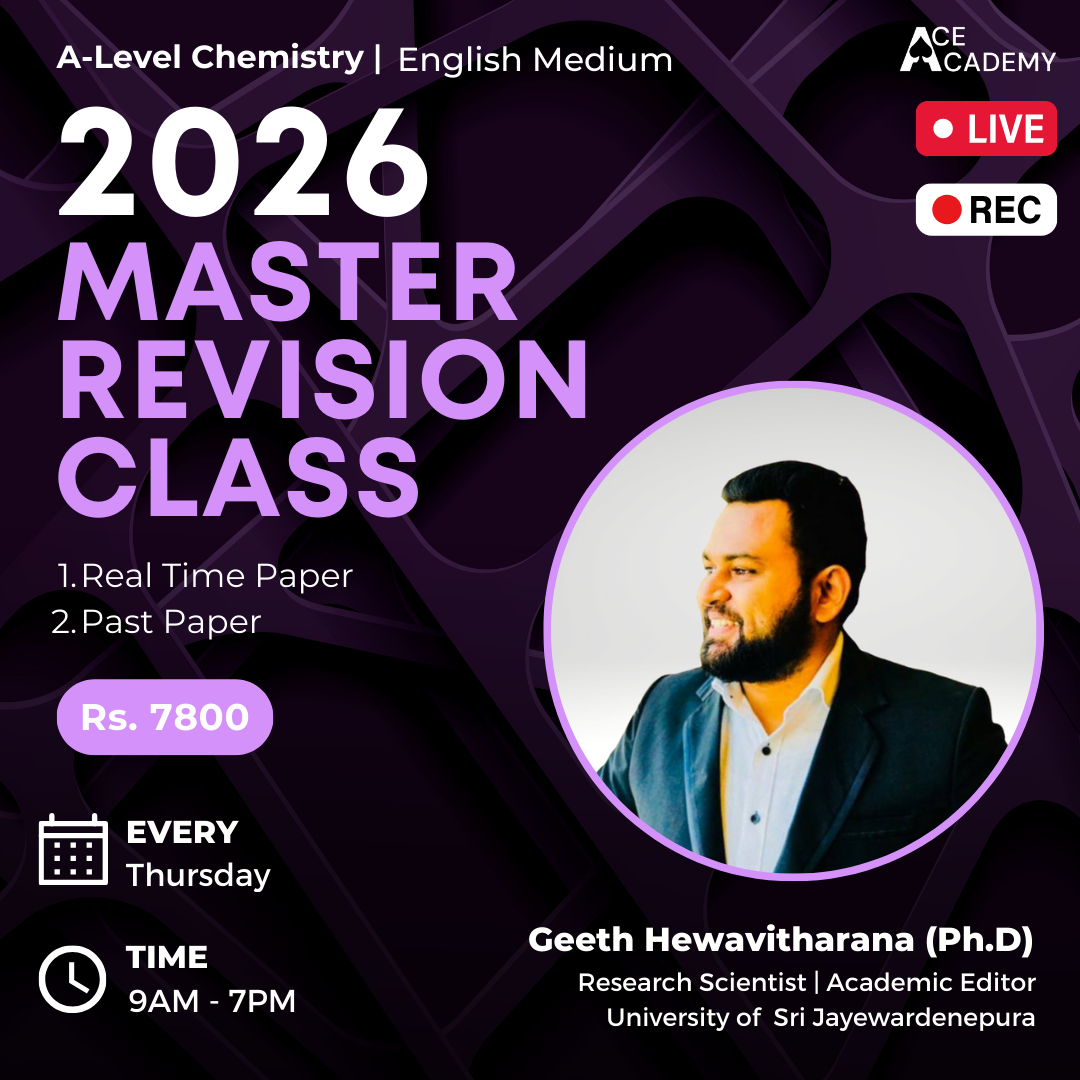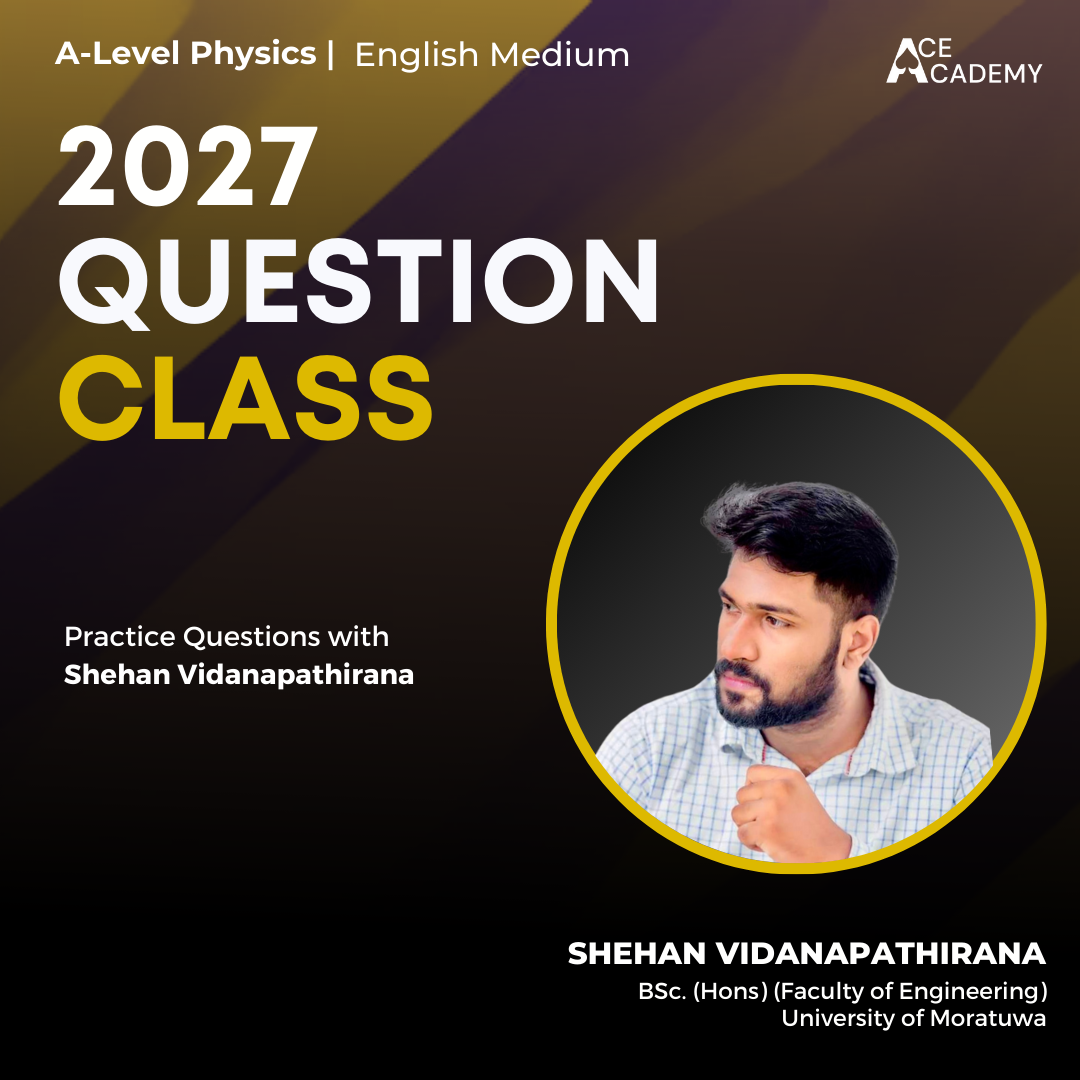[Impact] and [Work, Energy, Power] Comprehensive Study Pack
Purchase [Impact] and [Work, Energy, Power] Study Pack - For Advanced Level 2024 Batch
- 10 Users Enrolled
- Created by: Sudheera Peiris
- Last Updated: 11th March 2024
- English/සිංහල
- 3000
6000
Having trouble purchasing or accesing the course? Contact Us or checkout out our Support Page
Overview
Don't know how to join ZOOM meetings or watch recordings? Contact Us or find out how by watching this video.
|
Impact | ගැටුම - Day 01
|
|||
|
Impact | ගැටුම - Day 02
|
|
Work, Energy, Power | කාර්ය, ශක්තිය, ක්ෂමතාව - Day 01
|
|||
|
Work, Energy, Power | කාර්ය, ශක්තිය, ක්ෂමතාව - Day 02
|
Description
[Impact] and [Work, Energy, Power] Comprehensive Study Pack
- 4 Recordings (Theory / Paper Discussions / Past Paper Discussions)
- Tutorials
Advanced Level Combined Maths theory classes conducted by Mr. Sudheera Peiris.
This bundle is a collection of [Impact] and [Work, Energy, Power] Theory Classes conducted for 2024 Advanced Level Students. Please note that you are purchasing Recordings of live sessons conducted previously. By the end of this study pack you will learn the entire thoery coming under the [Impact] and [Work, Energy, Power] units.
The lesson on [Impact] and [Work, Energy, Power] carries 25 marks each in the final Applied Maths Paper, comprising half part of one Essay Question each. By watching these four videos, you will undoubtedly be able to secure all marks comfortably.
Importance of Studying Impact:
-
Understanding Momentum: Impact involves the transfer of momentum between objects during a collision or interaction. By studying impact, physicists and engineers gain insights into how momentum, a fundamental concept in classical mechanics, influences the behavior of objects in motion.
-
Analyzing Collisions: Impact analysis is crucial for understanding the outcomes of collisions between objects. Whether in physics experiments or engineering design, studying impact helps in predicting the velocities, directions, and energies of objects involved in collisions, aiding in the design of safety mechanisms and optimizing performance.
-
Designing Protective Systems: In engineering, the study of impact is vital for designing protective systems such as airbags, helmets, and crumple zones in vehicles. Understanding how different materials and structures absorb and dissipate impact energy enables engineers to enhance safety measures and minimize the risk of injury during accidents or impacts.
-
Assessing Structural Integrity: Impact testing is essential for evaluating the structural integrity and durability of materials and components. By subjecting materials to controlled impacts, engineers can assess their resilience, fracture resistance, and deformation behavior, ensuring they meet safety standards and performance requirements.
-
Advancing Technology: The study of impact continues to drive advancements in technology, particularly in fields such as automotive engineering, aerospace, sports equipment, and materials science. Through research and experimentation, scientists and engineers develop innovative materials, designs, and techniques to enhance impact resistance, improve performance, and promote safety across various industries.
Importance of Studying Work, Energy, and Power:
-
Quantifying Physical Processes: Work, energy, and power provide quantitative measures of physical processes such as motion, force, and transformations of energy. By studying these concepts, scientists and engineers can analyze and describe the relationships between forces, distances, velocities, and the transfer of energy within systems.
-
Conservation Laws: The principles of work and energy conservation are fundamental in physics and engineering. Understanding these principles allows researchers to analyze and predict the behavior of systems, including mechanical, electrical, and thermal processes, while ensuring that energy is conserved and accounted for in all transformations.
-
Optimizing Efficiency: Work, energy, and power analysis help in optimizing the efficiency of various systems and processes. By quantifying energy inputs, outputs, and losses, engineers can identify opportunities for improvement, reduce waste, and enhance the performance of mechanical devices, engines, and renewable energy systems.
-
Sustainable Development: The study of work, energy, and power is crucial for promoting sustainable development and environmental conservation. By analyzing energy consumption, emissions, and resource utilization, policymakers and engineers can develop strategies to minimize environmental impact, increase energy efficiency, and promote the adoption of renewable energy sources.
-
Engineering Design and Analysis: Work, energy, and power calculations play a vital role in engineering design, analysis, and optimization. From designing efficient mechanical systems to analyzing the performance of electrical circuits and thermal processes, engineers rely on work-energy principles to model, simulate, and optimize a wide range of engineering systems and components.
Q: What are the extra benefits of purchusing this bundle?
- Mr.Sudheera is a skilled teacher who has 8 years of teaching experience in Combined Maths and is well equipped to offer the best quality support
- Get your doubts clarified easily in the live class.
- You can post doubts on the WhatsApp group to be clarified by the teacher.
- Assistive technical team support to help you out.
Recently Added Courses
About the Instructor
Mr. Sudheera Peiris is an experienced and dedicated mathematics educator with a passion for teaching and inspiring students. With a background in mathematics and a solid understanding of pedagogical principles, he has been instrumental in helping students develop a strong foundation in math and excel in their academic pursuits.
He holds a Bachelor's degree in Mathematics from University of Colombo, where he graduated with honors.
With over Seven years of teaching experience, He has had the opportunity to teach a wide range of grade levels and student abilities. He has successfully implemented various teaching methodologies and differentiated instruction to accommodate diverse learning styles and help students grasp complex mathematical concepts.

.png)





